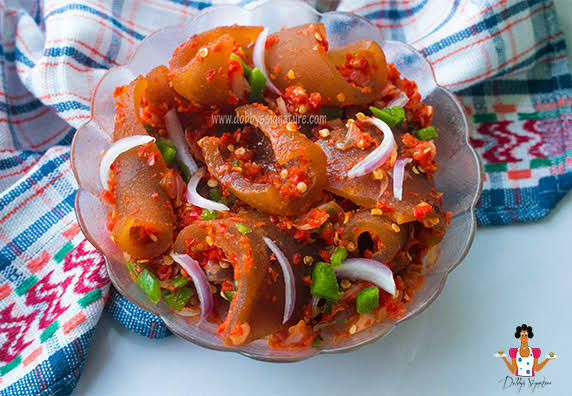Ponmo – cow skin, is usually made into a delicacy/snack that many Nigerians say they cannot do without. Its soft and delicious texture has also made it a must have in many Nigerian dishes like Egusi, Efo riro, ogbono and so on, while the peppered ponmo snack is often enjoyed with drinks.
Ponmo is obtained from cowhide and although it has little to no nutritional value, many people still prefer it to fish or meat.
Ponmo serves other purposes, especially production of leather. In South Africa, the Nguni people use it for shields.

However, the high consumption of ponmo among Nigerians is why it is first considered food before any other thing.
Madam Regina, a local food seller in Ogba area of Lagos, narrated how her customers will always request for ponmo compared to how much they request for fish, because it is cheaper.
“The reason bi say e no too cost. People wey hold N200 or N300 no fit buy meat, but dey go use N50, N100 buy ponmo (The reason is that it is cheaper. People with N200 or N300 can’t afford to buy meat, so they go for ponmo which they can get for N50 or N100)”.

A carpenter, Mr Olu Teslim, said he prefers ponmo because it is affordable and ‘closer to meat’.
“Ponmo is closer to you taking meat and it is more affordable than meat. The quantity is more than meat, the size is also bigger compared to meat,” said Mr Olu.
Another customer, Mr Olabode Moses, says he likes ponmo because it’s bigger than beef.
“Ponmo big pass meat because e get body. If to say I get money now, I go still buy ponmo because ponmo good for body (Ponmo is bigger than beef. If I have money, I would add another ponmo because it is good for the body),” he said while biting a portion of the ponmo which sits on his bowl of rice.

A female canteen owner, Mrs Nkechi Eze, said though ponmo is loved by a lot of Nigerians, it is important to consume it in moderation and to be aware of the potential health risks associated with its consumption.
“Ponmo is often processed using chemicals such as formalin, which is used to preserve the meat and prevent spoilage. Formalin is a known carcinogen and can be harmful to human health if consumed in large quantities. Finally, there is also a risk of bacterial contamination when consuming ponmo, as it is often handled and prepared in unsanitary conditions,” she said.

School teacher, Isaiah Caroline, who resides in Iju-Ishaga area of Lagos State, said it is a preferred option to cook meals in these ‘trying times’ when the prices of goods have skyrocketed a great deal.
She said, “I eat Ponmo a lot. It is very tasty and cheaper. To prepare a pot of soup, one will need beef worth at least N3,000, added to the cost of other ingredients. But with N1,000 worth of Ponmo, in addition to other ingredients, a decent pot of soup can be prepared for a family. Times are hard now and people are trying to adjust.
“Though they say Ponmo is harmful. I parboil and discard the water used to parboil it before making my meals with it. That is a safer method of consumption.”

Badagry-based entrepreneur James Segbenu stated that since he discovered the harmful process through which Ponmo is made, he had stopped consuming it.
“I don’t like it. It smells bad and it is also harmful to the body. If I have to eat it, I’d opt for the White Ponmo.
“I heard it’s processed using used tyres and fuel, which, in my opinion, is harmful to the environment and to one’s health too,” he said.
Though he admitted to eating Ponmo occasionally when he eats outside his home, businessman Obinna Ohanuba stated, however, that he never buys Ponmo to add to his meals.

He said, “When it is added to the food I buy in the market, I eat it. But I never buy it to cook at home.
“The odour is offensive and I heard that some of them are preserved with chemicals. Some even soak it for one week without bothering to change the water. You can imagine the odour. Some would get spoiled and they would still be mixed with the ones that are good.”
LASU undergraduate Franklin Okoro said he stopped consuming Ponmo a long time ago because he learnt it has no nutritional value.
“For something that smells so badly, no nutritional value and the process of making it is harmful, I do not eat Ponmo. I stopped eating it a long time ago,” he said.

Fashion designer Kemi Adeyi explained that though Ponmo is frequently consumed in her house, her family only consumes the White Ponmo.
She said, “We eat Ponmo in my house, but the White one. My mum stopped buying the Brown Ponmo a long time ago. The ones from female cows are the hard ones, compared to the soft ones from the male cow. But if it is soaked well, it gets soft enough for consumption.”
While there has not been a significant drop in the sales of the delicacy, there is now higher demand for the ‘White Ponmo’ as it is presumed safer for consumption.














